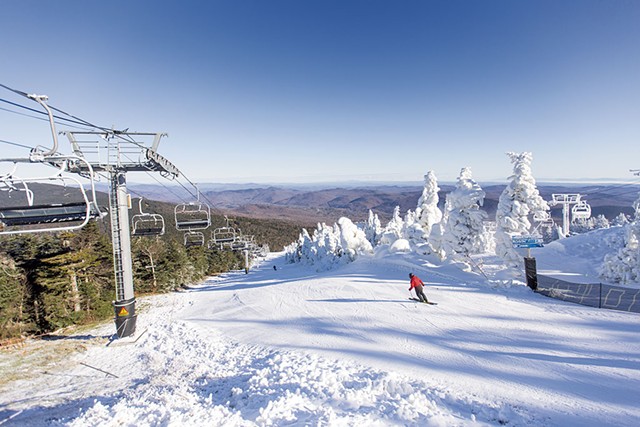
- Courtesy Of Killington Resort
- Opening day last Friday at Killington Resort
Diverted by COVID-19 restrictions from skiing at his usual haunts in Vermont last winter, Tim Dalton of Ridgefield, Conn., tried slopes in New Hampshire and Maine for the first time.
Dalton doesn't plan to vacation in those states again anytime soon. Now that Vermont has lifted its quarantine rules for out-of-staters, he's booked a trip to Smugglers' Notch Resort with 30 people from his ski club.
"Assuming Vermont does not reimpose any strict requirements, the plan is to go back to a more normal ski season, which would be heavily in Vermont," said Dalton, who has a soft spot for the state because he learned to ski at Killington Resort in the 1980s. He hopes vaccinations and experience with the virus will keep Vermont's borders open this winter.
"We're in a very different position than we were last winter, in terms of people's mindset and willingness to deal with COVID as a new reality," said Dalton, who is president of the Danbury Ski Club. "It's not going away, and we need to learn how we live with it."
COVID-19 turned last winter's ski season upside down. Vermont's restrictions, aimed at limiting infections, required out-of-state travelers to quarantine for two weeks, either at home or upon arrival, a rule that sharply reduced travel from the metro areas in the Northeast. The state also required people to wear masks on chairlifts and limited the capacity on lifts and in lodges to 50 percent. While Maine and New Hampshire had mask and capacity rules, their travel regulations were looser and easier to follow.
As a result, revenues plummeted by $100 million last season at Vermont resorts, said Bryan Rivard, a spokesperson for Ski Vermont. Skier visits dropped by about 30 percent, president Molly Mahar said earlier this year.
The state has lifted its travel restrictions and its safety requirements for ski areas, although individual resorts have an array of their own rules for the upcoming season. Some, including Mad River Glen and Killington, are requiring all workers to be vaccinated; many are asking staff and visitors to wear masks indoors. While it's not yet clear whether revenues will return to pre-pandemic levels, resort operators are reporting strong season pass sales and hotel bookings.
"Christmas and Martin Luther King Day weekend are trending as strong or stronger than the 2019-2020 season, right before COVID," said Kevin Mack, the general manager of Burke Mountain Resort. "There is pent-up demand out there."
Connecticut resident Audrey Rubin also chose New Hampshire over Vermont last winter because it was easier to travel there. This year, she has several trips planned to a friend's ski house in Mount Holly.
"I love the fact that Vermont put the health of its citizenry first," said Rubin, a clinical psychologist. "It makes me want to go back and spend my money there this year."
Some of Vermont's largest resorts were sold to corporations in recent years. Vail Resorts, which owns Okemo, Mount Snow and Stowe, offers an Epic Pass good at a number of North American resorts. Alterra Mountain Company, which owns Stratton and Sugarbush, sells its Ikon Pass.
John Bleh, communications manager for Sugarbush Resort, said Alterra's Ikon sales have been strong in the Northeast, and he expects a lot of those skiers will head to Sugarbush. But like other ski area representatives, he declined to provide numbers for resort hotel bookings or season pass sales, saying only that it appears skiers are headed back in high numbers. Stephanie Gorin, communications director for Smugglers' Notch, said the resort's condominiums were expected to be at capacity on holidays and weekends this winter.
At the White Horse Inn in Waitsfield, co-owner Bob Heffernan said bookings for Christmas through the end of March have come earlier than in prior years. White Horse was booked up all summer, and Heffernan expects to be so busy this winter that he and his partner will block off some of the inn's 26 rooms because they can't find staff to help them clean.
"It's been noticeably much heavier than what we normally see," said Heffernan. "Even on the weekdays."
In the run-up to ski season last year, resorts got state grants to buy equipment such as heaters, tents and firepits so visitors could gather outdoors. To divert people from lodge dining rooms, which have limited capacity, some resorts brought in food trucks and moved small food operations outdoors.
Many of those pandemic-era amenities will stay.
Mad River Glen last year built an outdoor hut called the Snack Shack and is expanding its menu options there this year. Mad River also capped season pass sales in order to limit the number of skiers on the mountain. That change is probably here to stay, marketing and events manager Ry Young said.
"We determined last year that lower skier density, especially on the better days of the season, delivers a better user experience," he said. Ski school enrollments and preseason pass sales indicate that it's going to be a busy winter, he added. Season passes sold out in mid-September.
Visitors to Bolton Valley Resort will still be able to pick up their rental equipment at an outdoor window, said president Lindsay DesLauriers.
"It's still kind of a hybrid year for us," DesLauriers said of the COVID-19 safety measures that remain.
Burke Mountain Resort usually puts the patio furniture away for the winter, but not this year, Mack said. Burke, too, will encourage outdoor ski prep, such as donning ski boots in cars, not the lodge.
Outdoor dining will be a permanent option at Magic Mountain, owner Geoff Hatheway said.
"It's not like the virus is magically going away; it's something we'll have to deal with for months, years, who knows for how long, with various variants and things of that sort," Hatheway said.
Another lingering condition is the shortage of job applicants — a nationwide problem, especially for hospitality positions. For workers who do sign on, there's a critical housing shortage.
Like many other ski areas, Killington Resort will rely on temporary foreign workers to fill some of its jobs. The resort is buying a nearby hotel for staff housing, president Mike Solimano said. It is Killington's second for this purpose.
"We've been increasing our international workers as we've been increasing our housing," Solimano said.
Remote ordering services that were established last year will reduce the burden on food and beverage staff, Bolton Valley's DesLauriers said.
"We're in a real staffing crisis, and that's something that can be automated," she said.
Weather is another critical variable the ski areas can't control. It's been an abnormally warm fall, but resorts are hoping for cold temperatures during Thanksgiving week so they can begin making snow.
Mad River's Young, like others, avoids long-range forecasts but hopes for the best. Mad River's marketing department posted a photo on Instagram last month of ski tracks running through half an inch of snow on the mountain, evidence that resort managers aren't the only ones impatient for the season to begin.
"The thing about the weather these days is, it turns on a dime," Young said. "We could be sitting here next week with a foot of snow on the ground."
It's also not clear where COVID-19 case rates are headed in Vermont. Whatever the future holds, Rubin, one of the skiers from Connecticut, said she learned last year that she prefers tailgating in the parking lot to navigating crowds in the lodge. She now travels with a portable barbecue and a small ice-fishing tent.
"I put a yoga mat on the ground, and a chair, and hang out in there and keep warm," she said. Last winter, having lunch outdoors, "People were just happy to be there," she added. "Everyone was raising their cans to each other. I thought, in some ways, it brought people more together, even though we were kept further apart."











Comments
Comments are closed.
From 2014-2020, Seven Days allowed readers to comment on all stories posted on our website. While we've appreciated the suggestions and insights, right now Seven Days is prioritizing our core mission — producing high-quality, responsible local journalism — over moderating online debates between readers.
To criticize, correct or praise our reporting, please send us a letter to the editor or send us a tip. We’ll check it out and report the results.
Online comments may return when we have better tech tools for managing them. Thanks for reading.